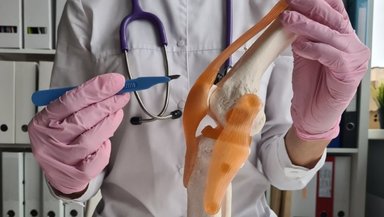Risks, Costs and Hidden Factors in Hip-Knee Revision Surgery You Must Know

Medicine Made Simple Summary
Hip or knee revision surgery can restore mobility and relieve pain when an implant fails, but it is more complex and costly than first-time replacement. Patients often underestimate the risks and hidden expenses involved. This article explains the medical risks, financial costs, insurance issues, and lesser-known factors like physiotherapy and long-term care. By understanding the full picture, patients and families can make informed decisions, prepare financially, and reduce stress during recovery.
Introduction: Why Awareness Matters
Revision surgery is a lifeline for patients whose first hip and knee replacement has failed. However, it is not a simple repeat procedure. The surgery is more complex, the risks are higher, and the costs can be significantly greater. Patients and families in India often focus only on the surgeon’s quoted fee, without considering hidden expenses and long-term rehabilitation needs. Being aware of the full picture ensures better financial and medical planning.
Why Revision Surgery Costs More
Revision surgeries often require:
- Longer operation times.
- Removal of old implants.
- Use of specialized revision implants (often more expensive).
- Additional tests and imaging.
- Longer hospital stays.
These factors naturally increase costs compared to first-time replacements. Patients should not be surprised if the bill is 30–50% higher than their initial surgery.
Average Cost of Revision Surgery in India
The cost of revision hip or knee replacement varies widely:
- Government Hospitals: ₹80,000 – ₹1.5 lakh.
- Tier-2 City Private Hospitals: ₹1.5 – ₹3 lakh.
- Metro City Super-Specialty Hospitals: ₹3 – ₹6 lakh.
- Premium or Complex Revisions: ₹6 – ₹10 lakh.
Costs include surgery but often exclude post-op physiotherapy, medicines, and travel expenses. Patients should always request an itemized estimate before admission.
Hidden Medical Costs Patients Overlook
1. Implants and Consumables: Revision implants are larger and costlier than standard ones.
2. Physiotherapy: A long-term requirement; 3–6 months of sessions may add ₹20,000–₹50,000.
3. Medicines and Supplements: Painkillers, antibiotics, calcium, and vitamin supplements.
4. Diagnostic Tests: MRI, X-rays, and repeated blood tests during follow-ups.
5. Hospital Stay Extensions: Complications may mean longer stays and higher room charges.
These hidden costs can surprise families if not anticipated.
Insurance Coverage in India: What to Know
Most insurance policies cover revision surgery, but limitations exist:
- Some policies exclude implant upgrades or imported implants.
- Waiting periods may apply for pre-existing orthopedic issues.
- Room rent caps may lead to higher out-of-pocket expenses.
- Consumables like bone cement or screws may not be fully covered.
Patients should always confirm coverage in writing before admission and seek pre-authorization from insurers.
Medical Risks of Revision Surgery
Revision surgery carries higher risks than primary replacements:
- Infection: More likely due to longer surgery and scar tissue.
- Blood Loss: Greater due to complex bone and tissue work.
- Nerve or Blood Vessel Injury: Rare but possible.
- Fractures Around the Implant: Especially in weak or osteoporotic bones.
- Re-Revision: Some patients may need further surgery if complications occur.
Understanding these risks helps patients prepare mentally and medically.
Recovery Challenges and Hidden Factors
Patients often assume recovery will be similar to their first replacement, but revision can be harder. Stiffness, longer physiotherapy, and emotional stress are common. Family members should be prepared for a longer caregiving role. Patients also need to plan for home modifications, mobility aids, and sometimes extended leave from work.
The Emotional and Mental Cost
Revision surgery is not just financially and physically demanding; it also takes an emotional toll. Patients may feel anxious, frustrated, or even depressed if recovery is slower than expected. Support groups, counseling, and family encouragement play a vital role in helping patients cope with the psychological side of recovery.
The Indian Context: Balancing Cost and Quality
In India, patients often face the challenge of balancing affordability with quality care. Government hospitals offer low-cost surgeries but with longer wait times, while private hospitals deliver faster care at higher prices. Patients should evaluate both cost and surgeon expertise before deciding. In many cases, traveling to a metro city for a specialist can be worth the added expense.
Checklist for Patients and Families
1. Ask for an itemized cost estimate before surgery.
2. Confirm insurance coverage for implants and consumables.
3. Budget for at least 3–6 months of physiotherapy.
4. Plan for additional expenses like medicines, supplements, and travel.
5. Keep an emergency fund for complications.
6. Seek emotional support and counseling if needed.
This checklist ensures that patients are financially and emotionally prepared.
Conclusion
If you are considering revision hip or knee surgery, don’t just focus on the surgical cost. Ask about hidden expenses, confirm insurance coverage, and prepare for the physical and emotional journey. With careful planning and the right support, patients can reduce stress, recover smoothly, and get back to active living.
References and Sources
Indian Arthroplasty Association
Insurance Regulatory and Development Authority of India







































